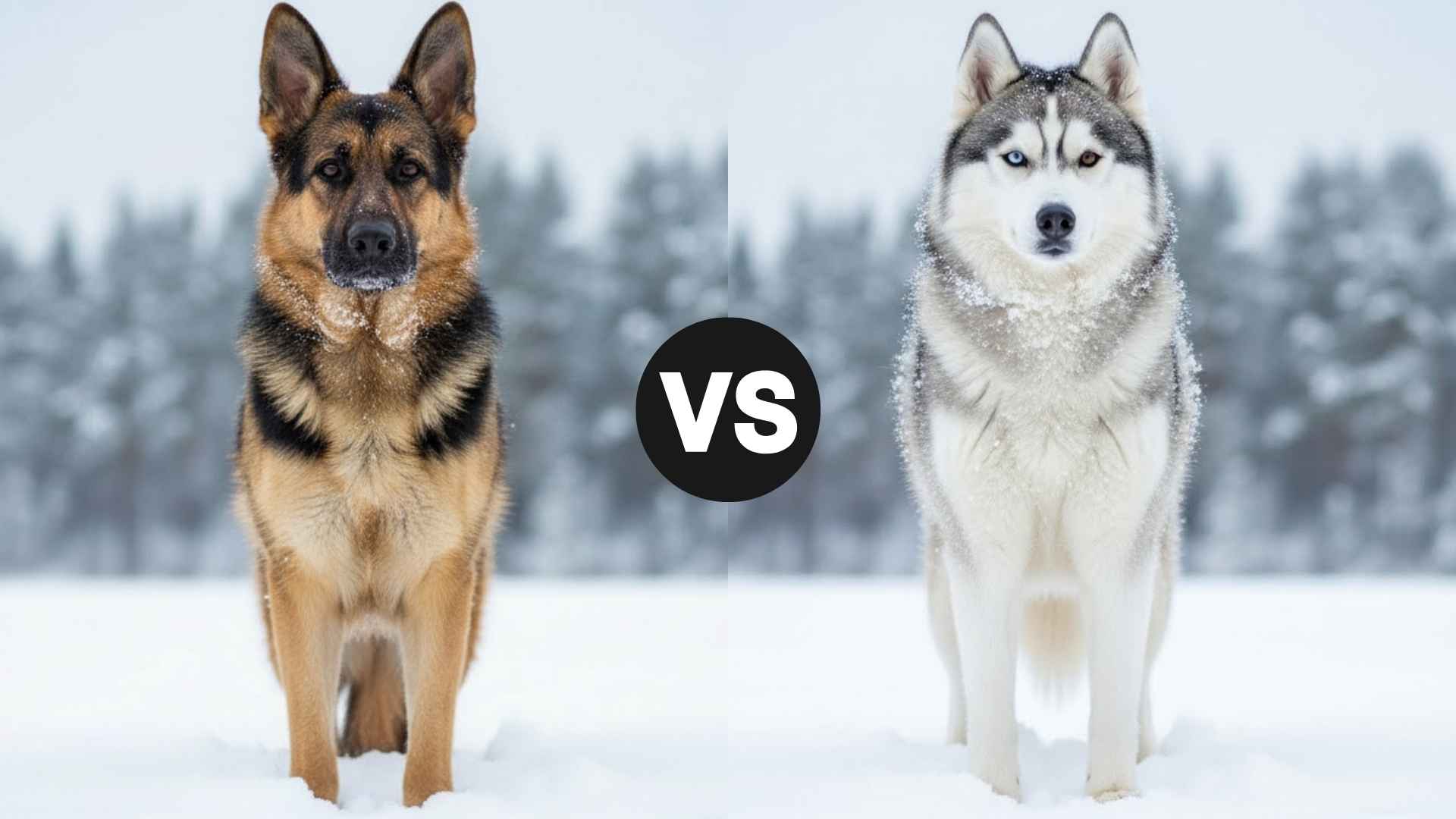When it comes to choosing a dog, few matchups spark as much debate as the German Shepherd versus the Husky. Both breeds are stunning, intelligent, and full of personality, yet they cater to very different lifestyles.
The German Shepherd is the epitome of loyalty, courage, and trainability—an ideal working dog and devoted family protector. Meanwhile, the Husky captures hearts with its striking eyes, wolf-like appearance, and boundless energy, making it the ultimate companion for adventure lovers.
The comparison isn’t just about looks or strength—it’s about temperament, care requirements, and daily energy. We’ll break down the key differences and similarities between these iconic breeds, from behavior and exercise needs to grooming and personality quirks.
Whether you’re drawn to the disciplined heroism of the German Shepherd or the playful wanderlust of the Husky, understanding their traits helps you pick the perfect companion.
German Shepherd vs. Husky: Which Dog Is the Perfect Companion for You?
Size & Build Differences
When it comes to size and build, German Shepherds and Huskies are like the two different flavors of “awesome dog”—each impressive in their own right, but in very different ways.
German Shepherd
PetMD mentions that German Shepherds are basically the athletes of the dog world. Think sleek, powerful, and built for action. With a strong back, deep chest, and legs that can power through a sprint faster than your morning coffee kicks in, these dogs exude confidence and capability.
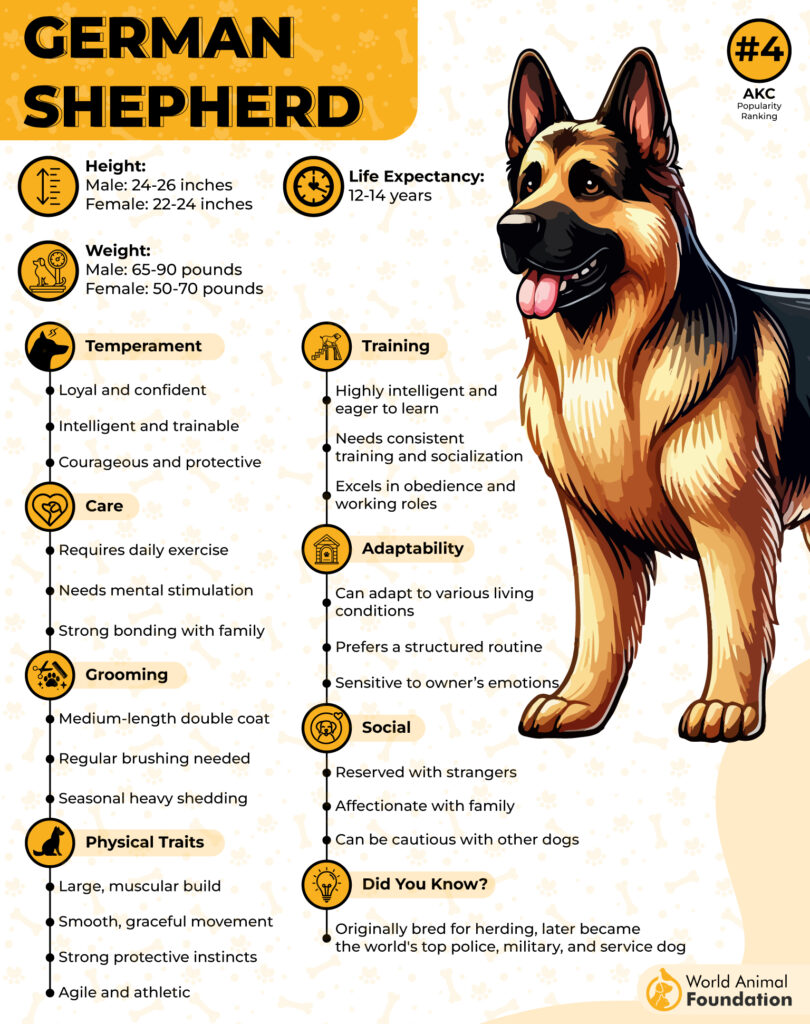
They’re the canine version of a SWAT team member—alert, sturdy, and ready to handle anything from frisbee wars to protecting your snacks (okay, mostly your snacks).
A fully grown male can tip the scales around 65–90 pounds, with females slightly smaller, but don’t worry—they’ll still eat your shoes with gusto.
Husky
Huskies, on the other paw, are the Siberian sprinters of the dog world. Leaner, lighter, and built for speed and endurance rather than brute strength, they look like they just stepped out of a snow-themed adventure movie.
Their compact, muscular bodies allow them to run for miles without breaking a sweat (or complaining about leg day).
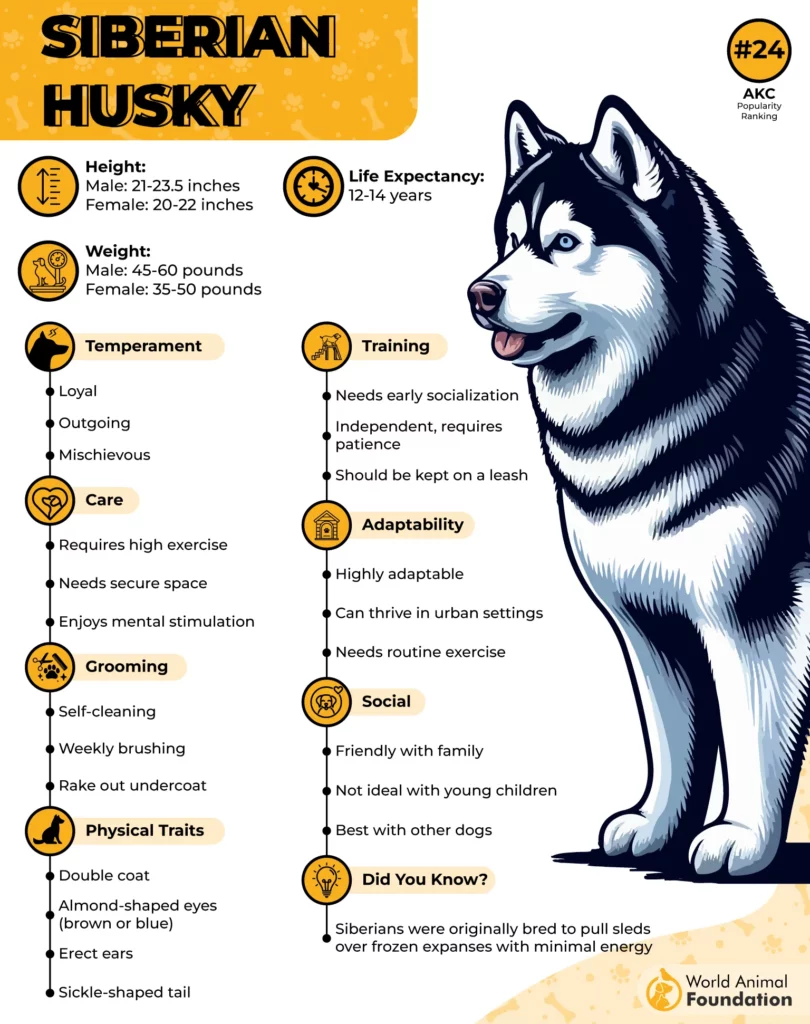
Adult males generally weigh 45–60 pounds, females a tad lighter, which makes them more agile but sometimes more “oops, I just escaped the yard” than the more grounded German Shepherd.
So, here’s the scoop: if you want a dog that looks like it could star in a superhero movie or handle the occasional “intruder in the living room,” a German Shepherd is your action hero.
Temperament & Personality
Choosing between a German Shepherd and a Husky isn’t just about size—it’s about personality traits, too. Think of it like dating: one’s the dependable, overachieving type, and the other… well, let’s just say they’ll make you laugh (and sometimes cry) every day.
German Shepherd
Loyal and deeply bonded to family, as mentioned by Britannica
Intelligent and highly trainable (brainiac of the dog world)
Protective and alert—great watchdog instincts
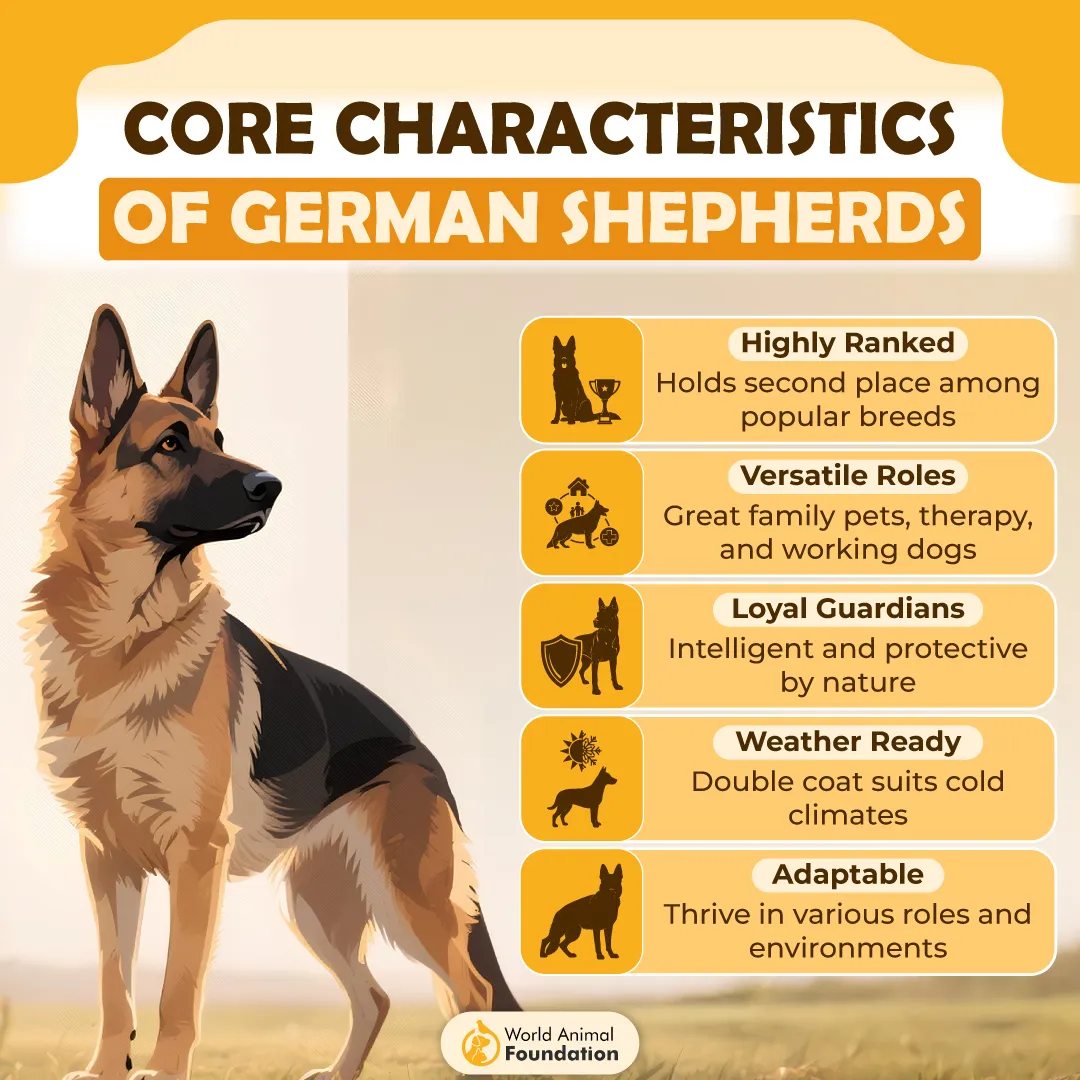
Husky
Friendly, social, and outgoing—loves people
Playful and mischievous; the class clown of dogs
Independent and stubborn; training can be a challenge
In short, German Shepherds are your loyal, intelligent guardian angels who keep life organized (and safe). Huskies are your playful, mischievous best friends who make every day an adventure—and occasionally leave a trail of snow, mud, or chaos in their wake.
Exercise & Energy Levels
German Shepherd
German Shepherds are high-energy but in a focused, disciplined way. They thrive on regular physical and mental stimulation. Structured exercises like fetch, agility courses, obedience training, or herding games keep them happy and healthy.
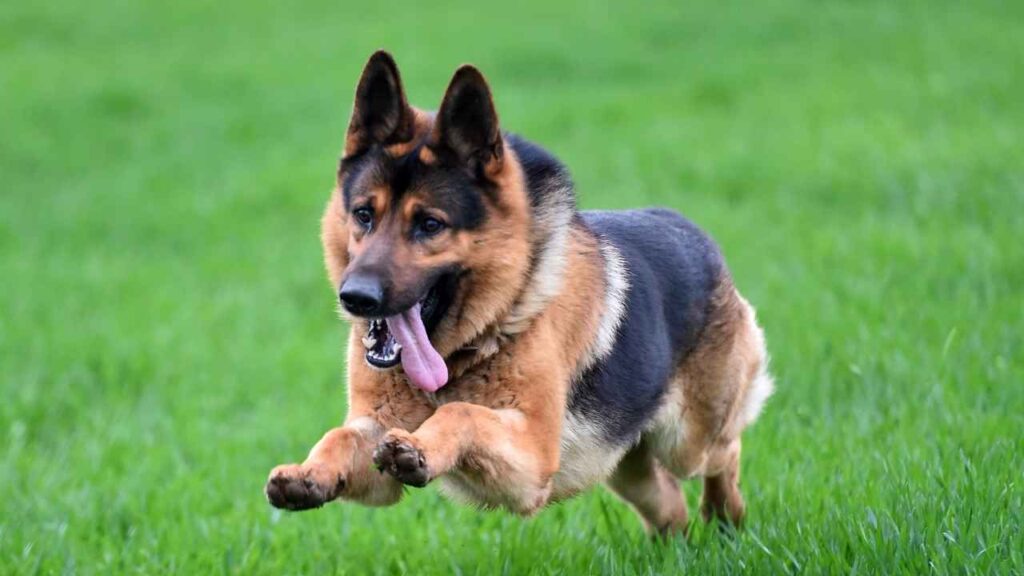
Long walks, runs, and hikes are perfect outlets for their stamina. They’re smart dogs, so puzzles, training sessions, and “jobs” are just as important as physical exercise. A bored German Shepherd can become a bit of a troublemaker, so keeping them engaged is key.
Husky
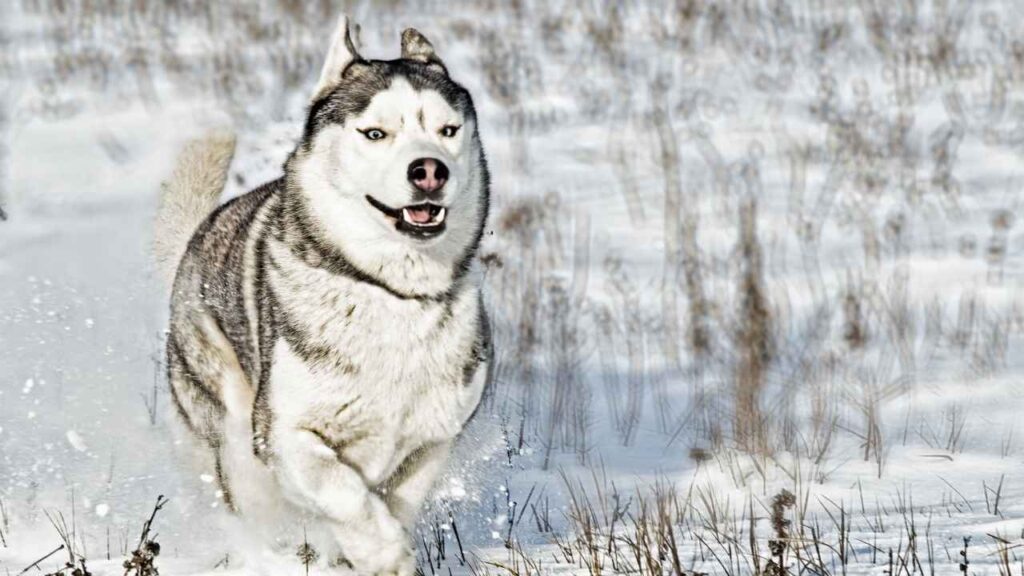
Huskies, on the other hand, are bundles of unstoppable energy. Built for running long distances, they need vigorous daily exercise to stay content, as noted by the AKC. Long walks, runs, or playtime in a secure yard are essential, and they absolutely love outdoor adventures—especially in the snow.
Mental stimulation helps, but it can’t replace the sheer physical activity they crave. Under-exercised Huskies often find their own ways to burn energy, which can include zoomies, digging, or attempting daring escapes.
Training & Intelligence
German Shepherd
German Shepherds are the geniuses of the dog world. They’re highly trainable, quick to learn commands, and love having a “job” to do. Whether it’s obedience, agility, or working roles like search-and-rescue or police work, GSDs thrive on structure and challenges.
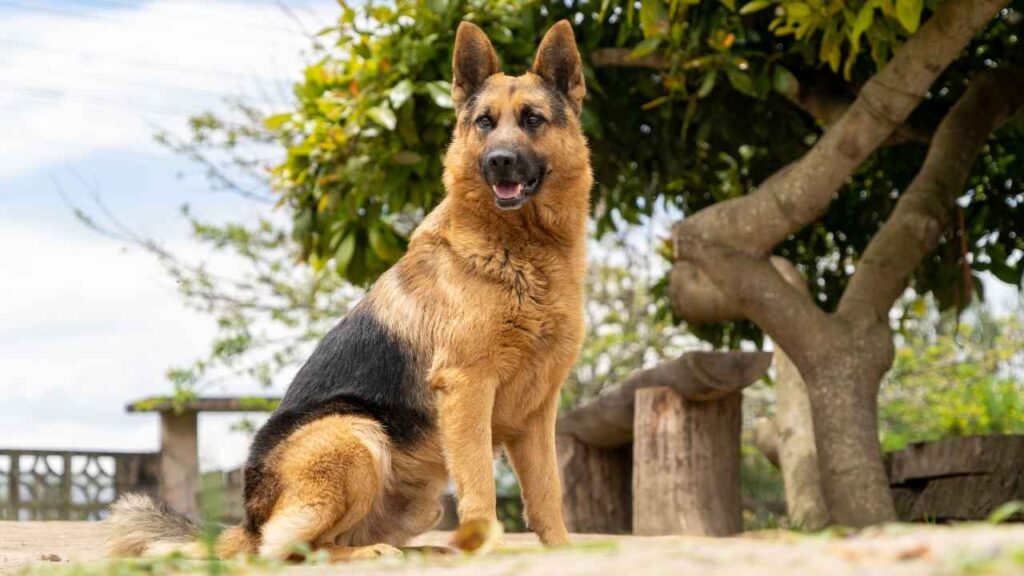
Their intelligence means they can pick up new skills faster than you can say “sit!” However, it also means they get bored easily—so consistent training, mental stimulation, and positive reinforcement are essential to keep them happy and well-behaved.
Husky
Huskies, by contrast, are smart but independent thinkers. They’re clever, resourceful, and sometimes a little stubborn, which can make training a fun—but occasionally frustrating—adventure. Huskies respond best to patience, consistency, and a sense of play.
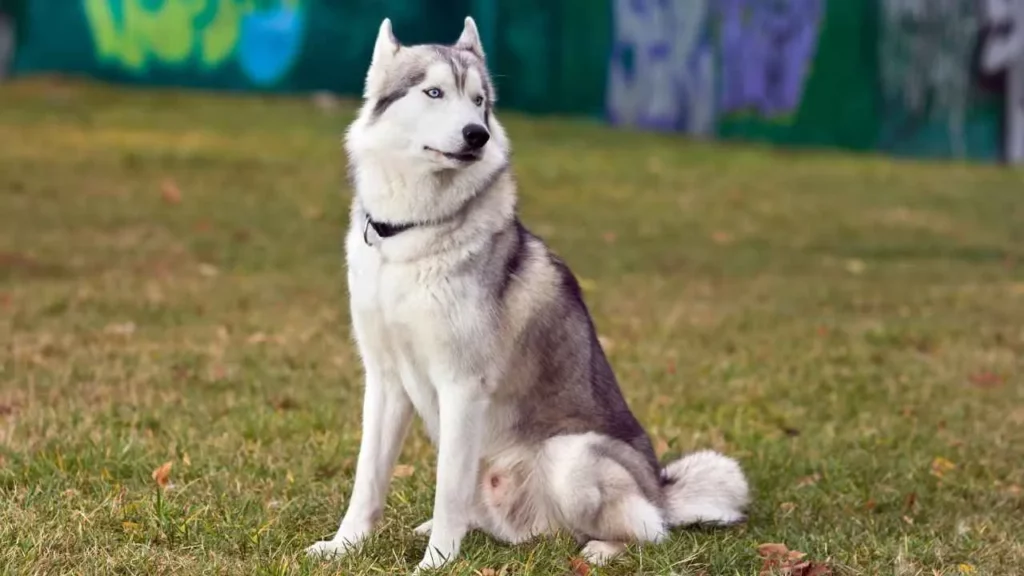
They’re less likely to follow commands just because you said so, preferring instead to negotiate their way (and look adorable doing it). While they’re not as naturally obedient as German Shepherds, their intelligence shines in problem-solving, agility, and creative ways to entertain themselves—and occasionally test your patience.
Vocal Behavior
German Shepherd
German Shepherds are known for their alert and commanding voices. They’re natural watchdogs, so you can expect some barking—especially when strangers approach or when something seems “off.”
Their bark tends to be deep and serious, more of a “I mean business” warning than a constant yappy chorus. While they aren’t typically nuisance barkers, they will let you know when they feel it’s necessary, which can be a huge advantage if you want a dog that takes guarding seriously.
Husky
Huskies, on the other hand, are the chatterboxes of the dog world. They’re famous for their vocalizations, which range from howls and yips to almost “talking” sounds that seem straight out of a musical.
Petplan mentions that while they’re usually friendly and not aggressive, they do tend to be noisy—especially when they’re excited, bored, or just want attention.
Living with a Husky means embracing the soundtrack of their expressive personality, which can be endearing… or mildly exasperating, depending on your tolerance for canine conversation.
Coat & Grooming
Both German Shepherds and Huskies have double coats, which means they’re built for the great outdoors—but also built for shedding all over your furniture. Understanding their grooming needs is key to keeping your home (and your sanity) intact.
German Shepherd
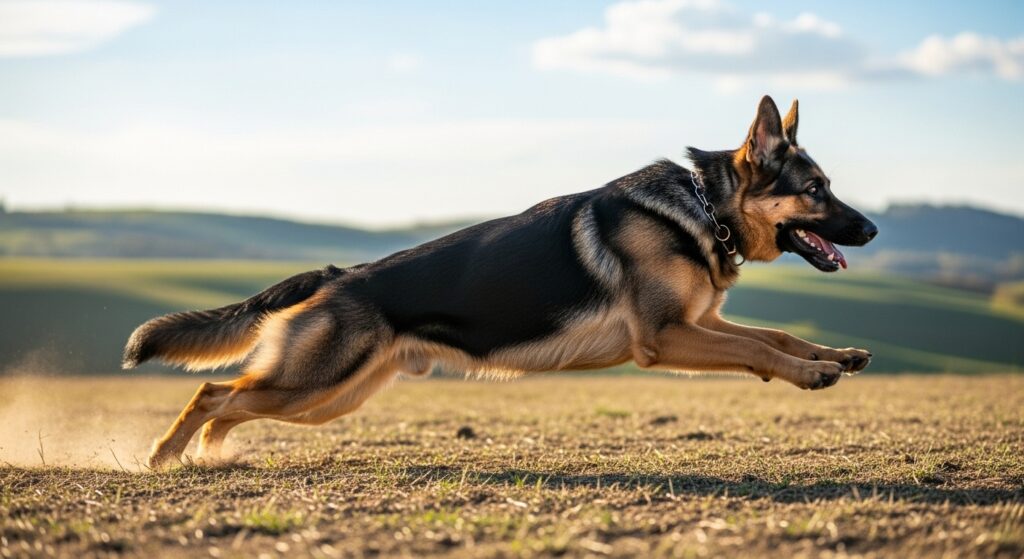
German Shepherds have a dense, straight double coat that can be short to medium in length. They shed year-round, with heavier “blowouts” twice a year when they change their undercoat.
Regular brushing—at least a few times a week—is essential to keep their coat healthy and reduce hair tumbleweeds around the house.
Brushing: 2–3 times per week, more during seasonal shedding
Bathing: Only when necessary; too frequent baths can strip natural oils
Nail trimming & ear checks: Weekly to biweekly to prevent issues
Coat style: Naturally sleek; minimal trimming needed
Husky
Huskies have a thick, plush double coat designed to survive freezing temperatures. They’re famous for “blowing coat” season, where huskies shed in massive clumps.
Daily brushing is ideal during shedding season, though even in winter, weekly brushing keeps their coat shiny and mats at bay. Bathing should be occasional, as their skin naturally regulates oils.
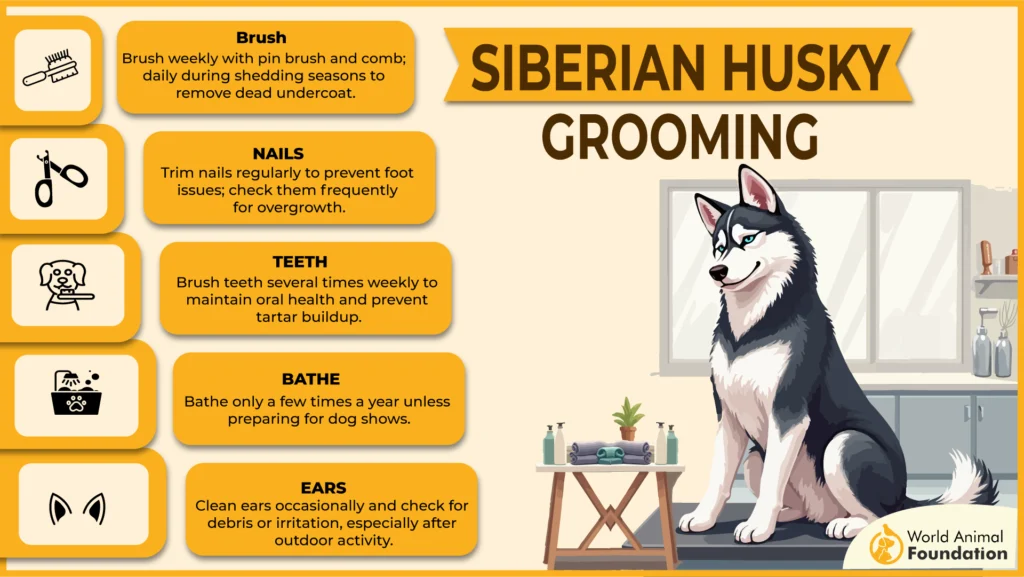
Brushing: Weekly, normally, daily during heavy shedding
Bathing: Occasional; Huskies are naturally clean and often smell “doggy-fresh.”
Nail trimming & ear checks: Weekly to keep them comfortable and healthy
Coat style: Fluffy and striking, often with beautiful color patterns
In short, German Shepherds are lower-maintenance daily but shed consistently, while Huskies are high-maintenance during shedding season but naturally clean and less “doggy-smelling.” Either way, a good brush and a vacuum nearby are your best friends.
Health Issues & Lifespan
German Shepherd
German Shepherds are generally robust, but like many large breeds, they can be prone to certain health concerns. German Shepherds typically live 9–13 years.
Hip and elbow dysplasia – common in larger dogs, can affect mobility
Degenerative myelopathy – a progressive spinal condition in some dogs
Bloat (gastric torsion) – life-threatening if not treated immediately
Skin allergies – can cause itching or discomfort
Husky
Huskies are famously hardy and have fewer genetic health problems compared to some other breeds. Huskies usually enjoy a slightly longer lifespan of 12–15 years, making them energetic companions for over a decade.
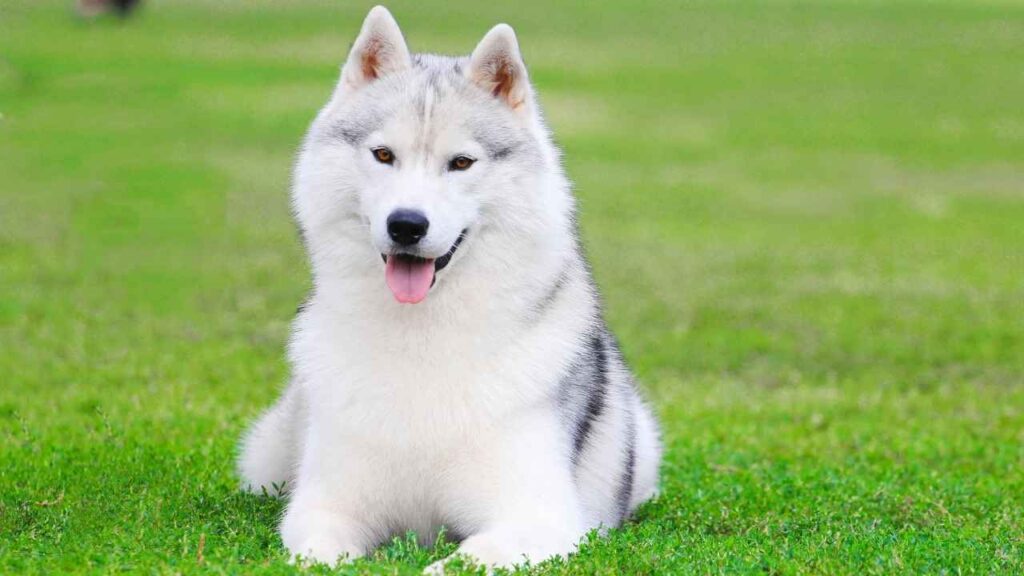
Eye problems– cataracts, corneal dystrophy, progressive retinal atrophy, and other vision problems
Hip dysplasia – less common but still possible
Generally hardy and resilient
Both breeds are generally healthy if cared for properly, but German Shepherds may require closer attention to joint health, while Huskies may need monitoring for eye conditions. Either way, preventive care, quality food, and regular activity go a long way toward a long, happy life.
Suitability For Home Security Vs Good for Families
Home Security
German Shepherd: Highly protective, alert, and confident; excellent watchdog.
Husky: Friendly and sociable; not naturally protective, more of a social companion.
Family-Friendly
German Shepherd: Loyal and loving; bonds deeply with family; good with kids if trained and supervised.
Husky: Playful, affectionate, and energetic; great for active families; requires exercise and patience.
Bottom line: German Shepherd = guardian + family dog. Husky = fun, energetic companion for active households.
Conclusion
Choosing between a Husky and a German Shepherd depends on what the owner is looking for in a pet. Siberian Huskies, known as sled dogs, and German Shepherds, both beautiful breeds of similar size, can be good family dogs if properly socialized from a young age.
Puppies of either breed benefit from basic commands, regular vet care, and exposure to children, humans, and other dogs.
Shepherds and Huskies both differ in temperament: German Shepherds are often wary and protective of livestock, while Huskies are eager and playful.
Selecting the right breed and age ensures a well-suited, interested, and happy pet for the family, making either choice a rewarding companion when the owner commits to training and socialization.


